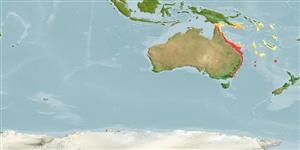分类 / Names
俗名 | 同种异名 | Catalog of Fishes(属, 种) | ITIS | CoL | WoRMS | Cloffa
Teleostei >
Eupercaria/misc (Various families in series Eupercaria) >
Sillaginidae (Smelt-whitings)
Etymology: Sillago: From a locality in Australia .
More on author: Cuvier.
Environment: milieu / climate zone / depth range / distribution range
生态学
海洋; 半咸淡水 居于水底的; 非迁移的; 深度上下限 0 - 46 m (Ref. 6335), usually 20 - 22 m. 熱帶; 9°S - 45°S, 142°E - 170°E (Ref. 6205)
Western Pacific: east coast of Australia from Cape York (rare) and the Great Barrier Reef, Queensland to eastern Victoria, Ulverstone on northeast coast of Tasmania; Lord Howe Island, New Caledonia, Woodlark Islands, and Papua New Guinea. Bleeker's records (Ref. 1502, 1843) from Batavia and Java were in error (Ref. 4899).
西太平洋: 來自約克岬 (稀有的) 與大堡礁,對東方的維多利亞的昆士蘭省的澳洲東岸, 在塔斯梅尼亞的海岸東北部上的 Ulverstone; 羅得豪島,新加勒多尼亞, Woodlark 島與巴布亞新幾內亞。 來自巴達維亞與爪哇的 Bleeker 的記錄 (參考文獻 1502,1843) 是錯誤。 (參考文獻 4899)
Length at first maturity / 大小 / 重量 / 年龄
Maturity: Lm 24.0 range ? - ? cm
Max length : 51.0 cm TL 雄鱼/尚未辨别雌雄; (Ref. 6205); 最大体重: 1.4 kg (Ref. 6390); 最大年龄: 22 年 (Ref. 1254)
背棘 (总数) : 12; 背的软条 (总数) : 16 - 18; 臀棘: 2; 臀鳍软条: 15 - 17; 脊椎骨: 32 - 34. The shape of the swim bladder is not distinguishable from that of S. analis. Anterior part of the swim bladder with rudimentary tubules projecting anteriorly and a series laterally that diminish in size and become sawtooth-like posteriorly. The coloration of adult specimens is uniform, without darker bars or blotches. A dark spot is present at the base of the pectoral fin in younger individuals.
泳鳔的形状 S. analis 不可与区别那。 前部那泳鳔有不发达的细管突出的前面地与系列侧面地那在大小方面减少而且在后部地变成像锯齿一样。 成鱼标本的颜色是均匀的, 没有深色的横带或斑块。 一个深色的斑点是在较年青的个体中出现在胸鳍的基底。
An onshore schooling species occurring on coastal beaches, sandbars, and surf zones as well as open bays, estuaries, coastal lakes (Ref. 6205), and rivers as far as tidal limits (Ref. 6390). Keep away from shore when older. Live almost exclusively on sandy ground. Juveniles and adolescents are abundant in shallow waters of rivers and creeks, over seagrass beds and in mangroves (Ref. 6223), although they tend to move into deeper water as they grow older (Ref. 6390). Larvae are present in river mouths and mangrove areas most of the year (Ref. 27634). Oviparous (Ref. 205). Feed mostly on polychaetes and crustaceans. Also caught using tunnel nets (Ref. 6205).
出现于海岸的海滩,河口沙洲与海浪区上的一个向陆的群游性种以及开放的海湾,河口,沿岸湖泊 (参考文献 6205) 与河远达潮汐的范围.(参考文献 6390) 生计远离海岸 , 当比较年长的时候。 几乎只倚赖沙的地面生活。 稚鱼与青少年河与小溪很丰富在浅水区中, 在海草床之上而且在红树林 (参考文献 6223) 中,虽然他们倾向,当他们生长比较年长,移进较深的水域中.(参考文献 6390) 仔鱼在河口与红树林区域全年大部分时间中出现。 (参考文献 27634) 卵生的.(参考文献 205) 大部分吃多毛類動物與甲殼動物。 也使用洞穴網捕捉。 (參考文獻 6205)
Sand whiting probably spawn twice each season (Ref. 1254, 27633). Spawning occurs at peak high tide, at night, and 1-2 days before the new moon (Ref. 6390).西太平洋: 來自約克岬 (稀有的) 與大堡礁,對東方的維多利亞的昆士蘭省的澳洲東岸, 在塔斯梅尼亞的海岸東北部上的 Ulverstone; 羅得豪島,新加勒多尼亞, Woodlark 島與巴布亞新幾內亞。 來自巴達維亞與爪哇的 Bleeker 的記錄 (參考文獻 1502,1843) 是錯誤。 (參考文獻 4899)
McKay, R.J., 1992. FAO Species Catalogue. Vol. 14. Sillaginid fishes of the world (family Sillaginidae). An annotated and illustrated catalogue of the sillago, smelt or Indo-Pacific whiting species known to date. Rome: FAO. FAO Fish. Synop. 125(14):87p. (Ref. 6205)
人类利用
渔业: 高经济性; 养殖: 实验的; 游钓鱼种: 是的; 水族馆: 公众的水族馆
工具
特别资料
下载 XML
网络资源
Estimates based on models
Preferred temperature (Ref.
123201): 21.2 - 27.4, mean 25.4 °C (based on 182 cells).
Phylogenetic diversity index (Ref.
82804): PD
50 = 0.5000 [Uniqueness, from 0.5 = low to 2.0 = high].
Bayesian length-weight: a=0.00617 (0.00340 - 0.01119), b=3.13 (2.96 - 3.30), in cm total length, based on LWR estimates for this species & (Sub)family-body (Ref.
93245).
营养阶层 (Ref.
69278): 3.2 ±0.2 se; based on diet studies.
回复力 (Ref.
120179): 中等的, 族群倍增时间最少 1.4 - 4.4年 (K=0.39; tm=2-3; tmax=22; Fec=31,000).
Fishing Vulnerability (Ref.
59153): Low to moderate vulnerability (28 of 100).
Nutrients (Ref.
124155): Calcium = 348 [82, 932] mg/100g; Iron = 1.22 [0.47, 3.13] mg/100g; Protein = 20.8 [18.0, 23.0] %; Omega3 = 0.221 [0.099, 0.482] g/100g; Selenium = 43.2 [14.8, 143.3] μg/100g; VitaminA = 27.7 [5.9, 122.3] μg/100g; Zinc = 1.25 [0.65, 3.06] mg/100g (wet weight);
